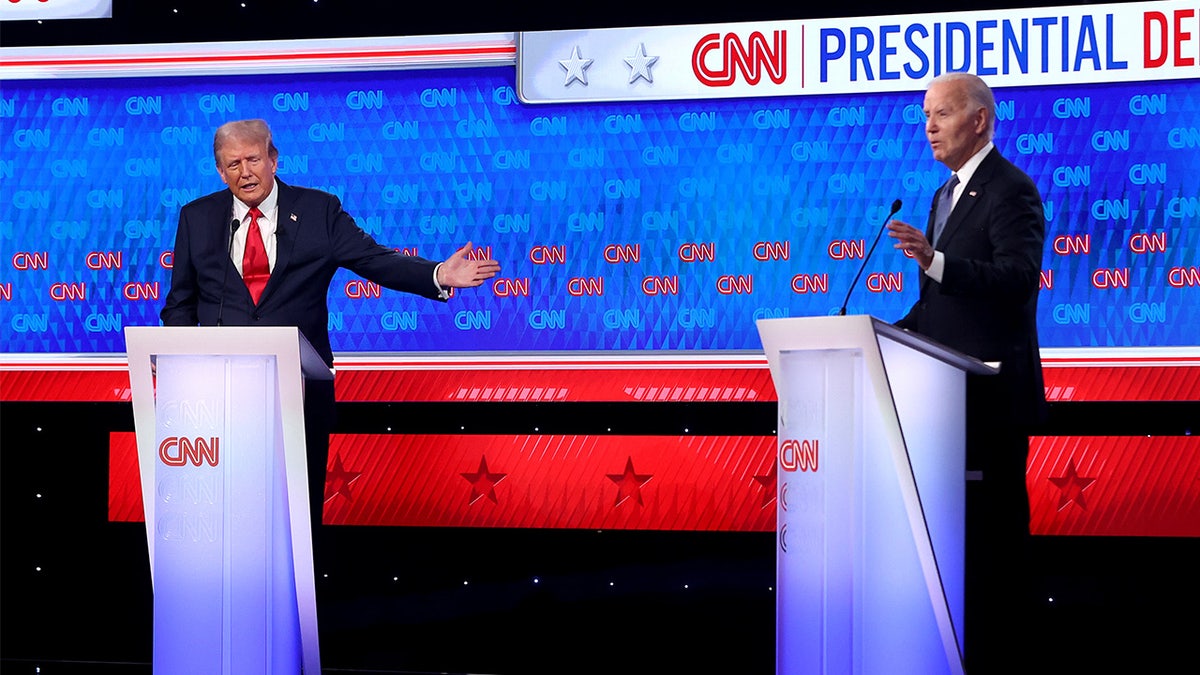Few presidents have bowed out like Biden. Historians explain what it means
NEWYou can now listen to Fox News articles!
Weeks after former President Joe Biden went head-to-head against now-President Donald Trump, Biden announced exactly a year ago, July 21, 2024, that he would bow out of the race — an unprecedented decision that led to a series of 2024 election plot twists.
Biden’s announcement came amid increasing pressure from his own party to step aside following his debate performance against Trump June 27, 2024, in Atlanta, where Biden struggled to answer seemingly basic questions.
Biden’s last-minute decision to exit the race rendered costly consequences for his party and his legacy — at least in the near future, according to experts.
BIDEN ENDS BID FOR SECOND TERM IN WHITE HOUSE AS HE DROPS OUT OF HIS 2024 REMATCH WITH TRUMP

“The way Biden handled his infirmity and his reluctant exit from the race will be devastating for his legacy,” Tevi Troy, presidential historian and the former deputy secretary of Health and Human Servicesunder George W. Bush, said in an email to Fox News Digital Thursday. “While Biden was once known as the person who slayed the dragon that Democrats see as Trump, he will now forevermore be known as the person who allowed the dragon to return.”
Even after his rough debate performance, Biden dug his heels in and refused to immediately hand over the baton to another candidate. Initially, Biden, along with his White House and his campaign, said that ending his run for reelection was off the table, and that he wanted to face Trump in November 2024.
But after calls from Democrat leaders, including former Sen. Jon Tester of Montana and Sen. Joe Manchin of West Virginia, Biden finally issued a statement claiming that he believed “it is in the best interest of my party and the country for me to stand down and to focus solely on fulfilling my duties as President for the remainder of my term.”
BIDEN’S STUNNING EXIT, ONE YEAR LATER: THE DROPOUT HEARD AROUND THE COUNTRY

As a result, Biden endorsed his vice president, Kamala Harris, to take his place in the race.
“I think it’s very difficult to separate the fact that he bowed out from the fact that he did so belatedly and only after his disastrous debate performance,” Alex Keyssar, a history professor at Harvard Kennedy School of public policy, said in an email to Fox News Digital. “That is true now and will also be true for his legacy for quite a while.
“He is seen as someone who made an enormous mistake — remaining as a candidate when he could have withdrawn six months earlier — and a mistake that may well have cost his party the presidential election,” Keyssar said.
Few presidents have chosen not to run for reelection, and even fewer have chosen to do so in the middle of a presidential campaign. The departure from the race marked the first time a presidential candidate had done so in nearly 60 years.
CLICK HERE TO GET THE FOX NEWS APP
Those who’ve called off their presidential bids in the middle of the campaign season include former presidents Harry S. Truman, who bowed out amid low polling, and Lyndon B. Johnson, who announced he wouldn’t run again amid tensions stemming from the Vietnam War and fractures within his own party.
Even so, they each withdrew from the race months ahead of Biden.
“Harry Truman and Lyndon Johnson both pulled out of reelection efforts in late March,” Troy said. “Joe Biden did it in late July, throwing the Democratic Party into turmoil.”
“While incumbents generally have the advantage in running for reelection, the history of incumbent parties after the incumbent chooses to drop out late is not great: Truman’s, Johnson’s and Biden’s party lost in each of the elections in question,” Troy said.

Since Biden pulled out of the race, multiple books have been written detailing Biden’s final days in office, his deteriorating mental faculties, and challenges within the Democratic Party as a result of his decision to withdraw from the election.
Additionally, multiple investigations are ongoing on Capitol Hill concerning Biden’s mental decline. For example, the House Oversight Committee is examining the cover-up of Biden’s cognitive decline and potentially unauthorized executive actions taken during his presidency.
Biden’s presidential approval rating reached a high of 57% from January 2021 to April 2021 after he first took office, but dropped to a low of 36% in July 2024, according to Gallup.
Even so, Keyssar predicted that time would soften public opinion toward Biden’s presidency.
“As an historian, looking further into the future, I can imagine that his legacy will become more positive, as historians and other analysts focus more on his achievements in office and his basic decency as a person,” Keyssar said.
